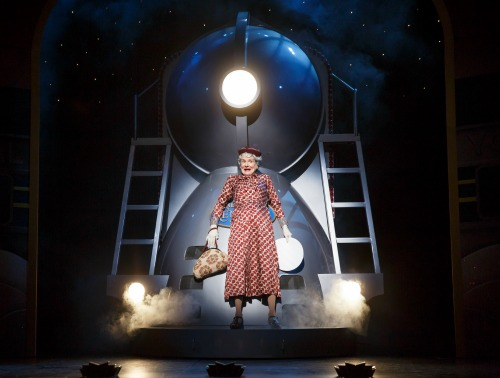Welcome to Building Character, our ongoing look at performers and how they create their rolesWhen Mary Louise Wilson urges the audience to "Repent, repent, repent!" in Roundabout Theatre Company's revival of the screwball musical comedy
On the Twentieth Century, everyone bursts out laughing. That's because her character, a seemingly sweet little old heiress, Letitia Peabody Primrose, lets us in on some secrets, including the fact that she, too, was once a hellion. As she sings, "Until one night I saw the light, and heard salvation's call. I'm so glad I didn't hear it, until I'd done it all!"
That last Betty Comden and Adolph Green lyric could also apply to Wilson herself. Born in 1932, approximately the same year
On the Twentieth Century, is set, she's made her living as a character actress for more than 50 years, earning an Obie as fashion icon Diana Vreeland in the solo show
Full Gallop (which Wilson also cowrote) and a Tony as bedridden eccentric Big Edie in the musical
Grey Gardens. But 2015 may be her busiest year yet: In addition to performing on Broadway, she's releasing a memoir,
My First Hundred Years in Show Business, and is the focus of the documentary
She's the Best Thing In It, which is currently making the film festival rounds. It's no wonder she slept through our original morning interview time.
"Once I get home after the show at 11pm, I can't go to sleep before 2am!" she explains. "We're all exhausted doing eight shows a week. For any actor it's a killer. It's very, very hard to keep the joie de vivre all the way through." Of course, that becomes even more difficult as one gets older. Yet Wilson isn't one to let her age get in the way of working---when asked if she'll ever retire, she jokes, "Lust doesn't die; neither does the wish to perform!" Still, she admits she initially had qualms about taking on Letitia. "Imogene Coca, who
did the role originally, was a soprano, so I thought, 'How the hell am I going to hit the high notes?'" she remembers. "I'm like a baritone normally. But the musical director, Kevin Stites, helped me to vocalize and enlarged my range. I also told Scott [Ellis, the director], 'I don't think I can do the matinees.' And he said, 'Yes, you can. We're going to have a little chair to sit in here, a little chair to sit in there.' He had faith I could do it. I did get on the treadmill more. And I started learning my big song ["Repent"] way before rehearsals began because my memory isn't as quick as it used to be. But I seem to be fine, knock wood."
Although Wilson's character has some fun scenes with the other kooky characters on a luxury train bound for New York City, her biggest moment comes toward the end of Act I, when she sings directly to the audience about our need to "Repent." While the musical is filled with eye-popping, dance-filled production numbers, this solo song stands out. In addition to being wonderfully wry, it's the only time in the show that a character completely breaks
the fourth wall. "I don't think in all my career 'veI have had a moment like that, full out talking to the audience," Wilson says. "Luckily, I am pretty blind without my glasses, so I don't have to worry about seeing any deadpan faces sitting out there."
Wilson, who says she tries to stay away from "cliché" old lady roles, is relishing her time as Letitia and plays her with great affection. "I just try to make her one of those ladies who loves the arts, that's the way I approach her," she says. "I think of her as one of those buxom old women
Helen Hokinson used to draw, or
Margaret Dumont in the Marx Brothers' movies, that's who I model her on."
Another thing she loves about Letitia: Like most of the parts Wilson has played, she's not a leading role. "I've always thought being a star is dangerous," she says. "I'd rather be to the left or the right of the spotlight. That's one thing about being older. I'm not trying to build a career here. I'm just trying to have fun and keep laughing. And I've never laughed as much as I have being in this show."
---
Raven Snook is the associate editor of TDF Stages
Photo by Joan Marcus
